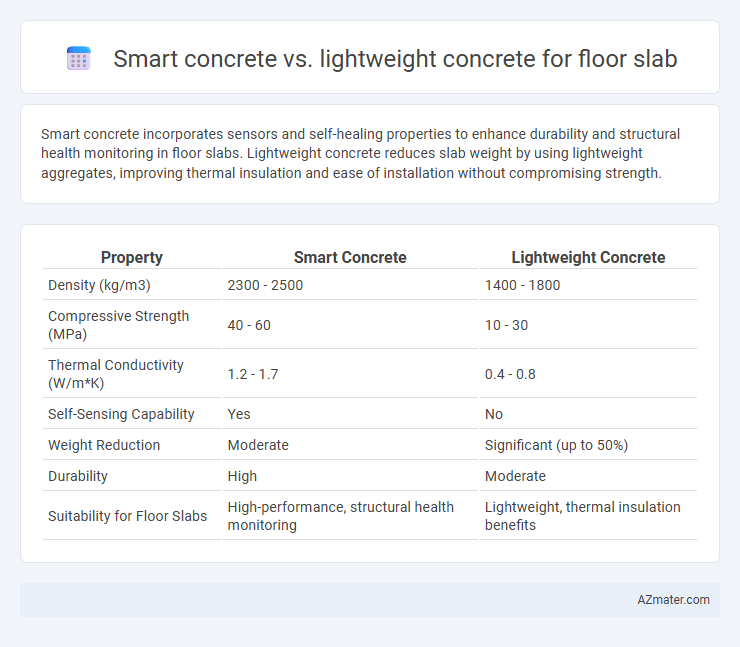Smart concrete incorporates sensors and self-healing properties to enhance durability and structural health monitoring in floor slabs. Lightweight concrete reduces slab weight by using lightweight aggregates, improving thermal insulation and ease of installation without compromising strength.
Table of Comparison
| Property | Smart Concrete | Lightweight Concrete |
|---|---|---|
| Density (kg/m3) | 2300 - 2500 | 1400 - 1800 |
| Compressive Strength (MPa) | 40 - 60 | 10 - 30 |
| Thermal Conductivity (W/m*K) | 1.2 - 1.7 | 0.4 - 0.8 |
| Self-Sensing Capability | Yes | No |
| Weight Reduction | Moderate | Significant (up to 50%) |
| Durability | High | Moderate |
| Suitability for Floor Slabs | High-performance, structural health monitoring | Lightweight, thermal insulation benefits |
Introduction to Modern Concrete Solutions for Floor Slabs
Smart concrete incorporates sensors and self-healing properties to enhance durability, reduce maintenance costs, and improve structural health monitoring in floor slabs. Lightweight concrete offers reduced dead load and improved thermal insulation, making it suitable for multi-story buildings and energy-efficient designs. Modern construction increasingly favors these innovative concretes to optimize floor slab performance, sustainability, and longevity.
What is Smart Concrete?
Smart concrete incorporates embedded sensors and self-monitoring capabilities to enhance structural health and durability in floor slabs. Unlike lightweight concrete, which primarily reduces load through low density materials, smart concrete optimizes performance by detecting stress, cracks, and environmental changes in real-time. This innovative technology improves maintenance efficiency and extends the lifespan of floor slabs inJian Zhu applications.
Understanding Lightweight Concrete
Lightweight concrete, composed of aggregates such as expanded clay, shale, or pumice, offers reduced density between 1,400 to 1,900 kg/m3 compared to traditional concrete, enhancing load-bearing efficiency in floor slabs. Its superior thermal insulation and fire resistance properties make it ideal for energy-efficient buildings, while maintaining adequate compressive strength for structural applications. Understanding the balance of lightweight concrete's mechanical performance and durability is crucial for optimizing floor slab design in modern construction.
Comparative Strength and Durability
Smart concrete exhibits superior compressive strength and enhanced durability compared to lightweight concrete, making it ideal for high-load floor slabs. Its advanced material properties enable self-healing and resistance to cracking, significantly extending the lifespan of concrete structures. Lightweight concrete offers reduced weight and improved thermal insulation but generally has lower strength and durability, limiting its application in heavy-duty floor slabs.
Weight Implications for Structural Design
Smart concrete incorporates advanced materials such as nanomaterials and sensors, resulting in enhanced strength-to-weight ratios compared to traditional concrete, thereby slightly reducing the overall floor slab weight and improving load distribution. Lightweight concrete, composed of lightweight aggregates like expanded clay or shale, significantly reduces the floor slab weight by up to 35%, effectively minimizing dead loads and easing structural demand on beams and foundations. The reduced weight from lightweight concrete allows for smaller structural members and foundation sizes, whereas smart concrete optimizes performance without drastic weight reduction, influencing different structural design considerations.
Thermal and Acoustic Insulation Differences
Smart concrete for floor slabs incorporates phase change materials or embedded sensors, enhancing thermal regulation by storing and releasing heat, which significantly reduces energy consumption and improves indoor comfort. In contrast, lightweight concrete offers innate thermal insulation due to its porous structure, effectively slowing heat transfer but providing moderate acoustic insulation by dampening sound waves. While smart concrete excels in adaptive thermal management, lightweight concrete is preferable for cost-effective thermal insulation and moderate soundproofing in floor slab applications.
Installation and Workability Considerations
Smart concrete offers enhanced workability with self-sensing properties that enable real-time monitoring of structural health, improving installation precision for floor slabs. Lightweight concrete, while easier to handle due to reduced density, may require careful mixing and curing to prevent issues like excessive shrinkage or reduced strength, affecting the installation timeline. Both materials demand specific handling techniques; smart concrete benefits from advanced placement methods to maintain sensor integrity, whereas lightweight concrete installation benefits from reduced dead load and ease of transport on-site.
Cost Analysis: Smart vs Lightweight Concrete
Smart concrete integrates sensors and nanomaterials, increasing initial costs by up to 30% compared to traditional concrete. Lightweight concrete reduces structural load, leading to potential savings in foundation and reinforcement expenses, often cutting total floor slab costs by 10-20%. Evaluating project-specific factors such as labor, material availability, and long-term maintenance is crucial for accurate cost comparison between smart and lightweight concrete solutions.
Sustainability and Environmental Impact
Smart concrete incorporates sensors and self-healing properties that extend the lifespan of floor slabs, reducing the need for frequent repairs and resource consumption, thereby enhancing sustainability. Lightweight concrete offers improved thermal insulation and reduces structural load, which lowers energy use during construction and operation, contributing to environmental benefits. Both materials support sustainable building practices by minimizing carbon footprint and promoting energy efficiency in flooring systems.
Choosing the Best Concrete Type for Your Floor Slab
Smart concrete incorporates self-healing properties and embedded sensors to monitor structural health, enhancing durability and reducing maintenance costs for floor slabs. Lightweight concrete offers reduced dead load and improved thermal insulation, making it suitable for long-span slabs and energy-efficient buildings. Choosing the best concrete type depends on project requirements such as load capacity, durability needs, thermal performance, and budget constraints.

Infographic: Smart concrete vs Lightweight concrete for Floor slab
 azmater.com
azmater.com